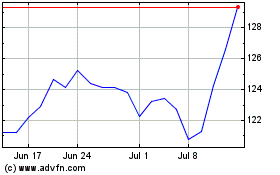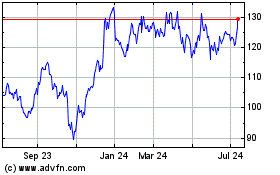Private-equity giant Blackstone Group LP is about to open up its
massive bet on single-family housing to outside investors.
Invitation Homes LP, which manages the largest pool of rental
homes in the U.S., has filed confidentially for an initial public
offering that could come as soon as January, according to people
familiar with the matter.
The Dallas-based company plans to sell about $1.5 billion worth
of stock and use the proceeds to pay down debt, one of the people
said. Based upon the portion of a company that is typically sold in
an IPO, Invitation Homes could be worth around $7.5 billion.
Deutsche Bank AG and J.P. Morgan Chase & Co. are among the
banks Invitation Homes tapped to lead the IPO, said people familiar
with the deal.
A public listing would set the stage for Blackstone to start
exiting the business, one of the biggest bets the firm has ever
made. As of last fall, the firm had spent roughly $10 billion to
acquire and fix up about 50,000 foreclosed homes, taking advantage
of bargain prices in the aftermath of the housing crash.
The deal's outcome also could cement the legacy of Jonathan
Gray, who runs the firm's $102 billion real-estate business and is
in line to eventually succeed co-founder Stephen Schwarzman as
chief executive. Mr. Gray recently was in the running to serve as
Treasury secretary under President-elect Donald Trump but said he
still had "much work to do at Blackstone."
An Invitation Homes IPO would come at a time when U.S. home
prices have reached all-time highs and homeownership rates are at
their lowest level in at least 50 years, suggesting that
rental-housing demand will remain robust.
Starting with a $100,000 home in Phoenix in 2012, Blackstone
went on a multiyear homebuying binge in 14 metropolitan areas. At
its peak, the firm was spending about $150 million a week on
foreclosed homes, often sight unseen. Invitation Homes now manages
about 50,000 homes.
In an interview last year, Mr. Schwarzman said the firm's
housing bet began after the foreclosure crisis when banks were
loaded with repossessed homes and under pressure from regulators to
tighten lending standards.
"We said, 'Oh my goodness, this could be huge. Nobody is going
to be able to borrow, they're going to need housing,'" Mr.
Schwarzman told The Wall Street Journal. "So we went out and
started to buy houses to rent to people."
The wager spawned follow-on investments at the firm. When
Blackstone found itself unable to secure financing for its
purchases, it decided to launch a company, B2R Finance LP, that
lends specifically to landlords. To recoup some of the cash it
spent on homes, Blackstone and its bankers created a new type of
bond backed by rental income from batches of homes.
Though Blackstone assembled the largest pool of homes, it isn't
the only Wall Street firm that scooped up big swaths of Main
Street.
With cash from Alaska's state oil fund, self-storage magnate B.
Wayne Hughes launched American Homes 4 Rent, which owns about
48,000 homes in 22 states.
Real estate moguls Barry Sternlicht and Thomas J. Barrack Jr.
merged their rental-home portfolios earlier this year to make the
country's third largest landlord, Colony Starwood Homes, which said
it owned 30,407 houses as of Sept. 30.
Donald Mullen Jr., a former Goldman Sachs Group LP executive who
a decade ago helped oversee the firm's lucrative bet against the
housing market, has been soliciting investors for $1 billion to buy
homes to add to the 16,500 houses his Progress Residential has
already bought.
The stock market reception for American Homes 4 Rent and Colony
Starwood was tepid at first, as investors questioned their ability
to efficiently maintain houses spread across the country and
wondered whether they would abandon on the rental business and sell
the homes when prices rebounded.
But their stocks have risen this year to move closer to the
value of their properties. Colony Starwood shares are up 34.9%,
giving the company a market value of about $3.1 billion. American
Homes 4 Rent shares are up 26.5%, and the company has a market
value of nearly $5 billion. The companies are structured as
real-estate investment trusts, which manage properties, collect
rent and pass profits onto shareholders.
On a conference call with analysts in July, Blackstone President
Hamilton "Tony" James said Invitation Homes was still buying homes,
though in lower volumes, despite rising prices. He said the company
had become a "more mature investment in terms of rate of growth"
for Blackstone.
Blackstone has indicated plans to take Invitation Homes public
by early next year, without being more specific.
Write to Matt Jarzemsky at matthew.jarzemsky@wsj.com, Dana
Mattioli at dana.mattioli@wsj.com and Ryan Dezember at
ryan.dezember@wsj.com
(END) Dow Jones Newswires
November 30, 2016 19:05 ET (00:05 GMT)
Copyright (c) 2016 Dow Jones & Company, Inc.
Blackstone (NYSE:BX)
Historical Stock Chart
From Mar 2024 to Apr 2024

Blackstone (NYSE:BX)
Historical Stock Chart
From Apr 2023 to Apr 2024
